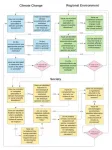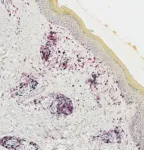Towards a better understanding of societal responses to climate change
Scholars of archaeology, geography, history and paleoclimatology lay out a new framework for uncovering climate-society interactions
2021-03-24
(Press-News.org) As the signs of today's human-caused climate change become ever more alarming, research into the ways past societies responded to natural climate changes is growing increasingly urgent. Scholars have often argued that climatic changes plunge communities into crisis and provide the conditions that lead societies to collapse, but a growing body of research shows that the impacts of climate change on past populations are rarely so straightforward.
In a new paper published in Nature, scholars in archaeology, geography, history and paleoclimatology present a framework for research into what they term 'the History of Climate and Society' (HCS). The framework uses a series of binary questions to address problems and biases common to HCS and requires researchers to consult or include scholars from a variety of scientific, social scientific and humanistic disciplines.
"We wanted to figure out why so much research in this area is focused on disaster and how we could encourage more research into the strategies that allowed past populations to cope with climate change," says Dagomar Degroot, associate professor of environmental history at Georgetown University and the study's first author. "With this framework we hope to help other researchers find more diverse connections between climate and society, which we hope will lead both to a more realistic understanding of the past and a better guide to the future."
Using the newly developed framework, the researchers put together case studies of societies that adapted to two of the most frequently studied periods of climate change: The Late Antique Little Ice Age of the sixth century and the Little Ice Age of the thirteenth to nineteenth centuries. Although both of these periods imposed hardships on many communities, the case studies revealed that populations adapted by exploiting new opportunities, relying on resilient energy systems, drawing on resources provided by trade, responding effectively to disaster, or by migrating to new environments.
One example of this resilience can be seen in societal responses to climate change in the Eastern Mediterranean under Roman rule. Environmental reconstructions using lake sediments, speleothems and other proxy data show increased winter precipitation beginning in the fifth century and continuing through the Late Antique Little Ice Age. Pollen data and archaeological surface surveys reveal that cereal agriculture and pastoral activities thrived as a result of the increased rainfall, with many settlements increasing in density and area. Regional economic practices allowed goods to circulate between communities easily, bringing the benefits of increased agricultural production to consumers. Meanwhile, elites invested in market-oriented agriculture and financed the construction of dams and other infrastructure that allowed farmers to manage water more effectively.
"The success story of the late Roman Eastern Mediterranean demonstrates that adverse climatic conditions do not necessarily lead to collapse or social hardship. This well-organized and resourceful society was capable of adapting and exploiting the new opportunities," says Adam Izdebski of the Max Planck Institute for the Science of Human History. "Of course, with the increasing dryness predicted in this part of the world in the 21st century, the adaptation measures required today should be both different and much more ambitious, which further underlines the need to cut CO2 emissions on a massive scale as quickly as possible."
Although the changes in climate faced by past societies were smaller in magnitude than the changes we now face, these case studies show that communities and societies often adapted and persisted through periods of climatic variability. With a research framework that accounts for the heterogeneous effects of past climate changes and the challenges of interpreting historical sources, the authors hope that future studies into the History of Climate and Society will identify previously overlooked examples of resilience in the past and aid efforts to adapt to the unprecedented global warming that faces societies today.
INFORMATION:
[Attachments] See images for this press release:

ELSE PRESS RELEASES FROM THIS DATE:
2021-03-24
LEBANON, NH - Some melanoma patients respond very well to immunotherapy, experiencing profound and durable tumor regression. A fraction of these patients will also develop autoimmunity against their normal melanocytes--the cells that give rise to melanoma--a phenomenon called vitiligo. Melanoma survivors with vitiligo have long been recognized as a special group with an outstanding prognosis, and a strong response of immune system cells called T cells.
Immunotherapy researchers at Dartmouth's and Dartmouth-Hitchcock's Norris Cotton Cancer Center (NCCC) led by Mary Jo Turk, PhD, and surgical oncologist Christina Angeles, MD (now of University of Michigan), have discovered how a subset ...
2021-03-24
The ocean is dynamic in nature, playing a crucial role as a planetary thermostat that buffer global warming. However, in response to climate change, the ocean has generally become stabler over the past 50 years. Six times stabler, in fact, than previously estimated--as shown by a new study that researchers from the CNRS, Sorbonne University, and IFREMER have conducted within the scope of an international collaboration.* Warming waters, melting glaciers, and disrupted precipitation patterns have created an ocean surface layer cut off from the depths. Just as oil and ...
2021-03-24
Training babies' brains and bodies might delay the onset of Rett syndrome, a devastating neurological disorder that affects about 1 in 10,000 girls worldwide.
In experiments with mice that replicate the genetic disorder, scientists discovered that intense behavioral training before symptoms develop staves off both memory loss and motor control decline. Compared to untrained mice, those trained early in life were up to five times better at performing tasks that tested their coordination or their ability to learn, Howard Hughes Medical Institute Investigator Huda Zoghbi and her colleagues report March 24, 2021, in the journal Nature.
Those data, from animals whose symptoms closely mimic the human disease, offers a clear rationale for genetically screening newborns for Rett syndrome, ...
2021-03-24
New York, NY (March 24, 2021) -- Immunotherapy is not only significantly less effective in liver cancer patients who previously had a liver disease called non-alcoholic steatohepatitis (NASH), but actually appears to fuel tumor growth, according to a Mount Sinai study published in Nature in March. NASH affects as many as 40 million people worldwide and is associated with obesity and diabetes.
The researchers led a large international collaboration to investigate immunotherapy's effect on hepatocellular carcinoma (HCC), a deadly liver cancer, caused by NASH. They conducted a meta-analysis ...
2021-03-24
New scientific findings bring hope that early training during the presymptomatic phase could help individuals with Rett syndrome, a neurodevelopmental disorder, retain specific motor and memory skills and delay the onset of the condition. Researchers at Baylor College of Medicine and the Jan and Dan Duncan Neurological Research Institute at Texas Children's Hospital reported in the journal Nature that, in a mouse model of Rett syndrome, intensive training beginning before symptoms appear dramatically improved the performance of specific motor and memory tasks and substantially delayed the appearance of symptoms.
The researchers propose that newborn genetic testing for Rett syndrome, followed by prompt intensive training in the skills that will be affected, such ...
2021-03-24
Immunotherapy using checkpoint inhibitors is effective in around a quarter of patients with liver cancer. However, to date, physicians have been unable to predict which patients would benefit from this type of treatment and which would not. Researchers from the German Cancer Research Center have now discovered that liver cancer caused by chronic inflammatory fatty liver disease does not respond to this treatment. On the contrary: in an experimental model, this type of immunotherapy actually promoted the development of liver cancer, as now reported in the journal Nature.
Liver cancer is the sixth most common type of cancer in the world, ...
2021-03-24
The heart of any computer, its central processing unit, is built using semiconductor technology, which is capable of putting billions of transistors onto a single chip. Now, researchers from the group of Menno Veldhorst at QuTech, a collaboration between TU Delft and TNO, have shown that this technology can be used to build a two-dimensional array of qubits to function as a quantum processor. Their work, a crucial milestone for scalable quantum technology, was published today in Nature.
Quantum computers have the potential to solve problems that are impossible to address with classical computers. Whereas current ...
2021-03-24
HOUSTON ? Overcoming previous technical challenges with single-cell DNA (scDNA) sequencing, a group led by researchers at The University of Texas MD Anderson Cancer Center has developed a novel method for scDNA sequencing at single-molecule resolution. This technique revealed for the first time that triple-negative breast cancers undergo continued genetic copy number changes after an initial burst of chromosome instability.
The findings, published today in Nature, offer an accurate and efficient new approach for sequencing hundreds of individual cancer cells while also providing novel insights into cancer evolution. These insights may explain why treatments are ...
2021-03-24
Joint press release by the German Cancer Research Center, University Medicine Mannheim, Heidelberg University Hospital, and the National Center for Tumor Diseases (NCT) Heidelberg
Tumor vaccines can help the body fight cancer. Mutations in the tumor genome often lead to protein changes that are typical of cancer. A vaccine can alert the patients' immune system to these mutated proteins. For the first time, physicians and cancer researchers from Heidelberg and Mannheim have now carried out a clinical trial to test a mutation-specific vaccine against malignant brain tumors. The vaccine proved to be safe and triggered the desired immune response in the tumor tissue, as the team now reports in the journal Nature.
Diffuse ...
2021-03-24
Researchers have developed experimental flu shots that protect animals from a wide variety of seasonal and pandemic influenza strains. The vaccine product is currently being advanced toward clinical testing. If proven safe and effective, these next-generation influenza vaccines may replace current seasonal options by providing protection against many more strains that current vaccines do not adequately cover.
A study detailing how the new flu vaccines were designed and how they protect mice, ferrets, and nonhuman primates appears in the March 24 edition of the journal Nature. This work was led by researchers at the University of Washington School of Medicine and the Vaccine
Research Center part of the National Institute of Allergy ...
LAST 30 PRESS RELEASES:
[Press-News.org] Towards a better understanding of societal responses to climate change
Scholars of archaeology, geography, history and paleoclimatology lay out a new framework for uncovering climate-society interactions


